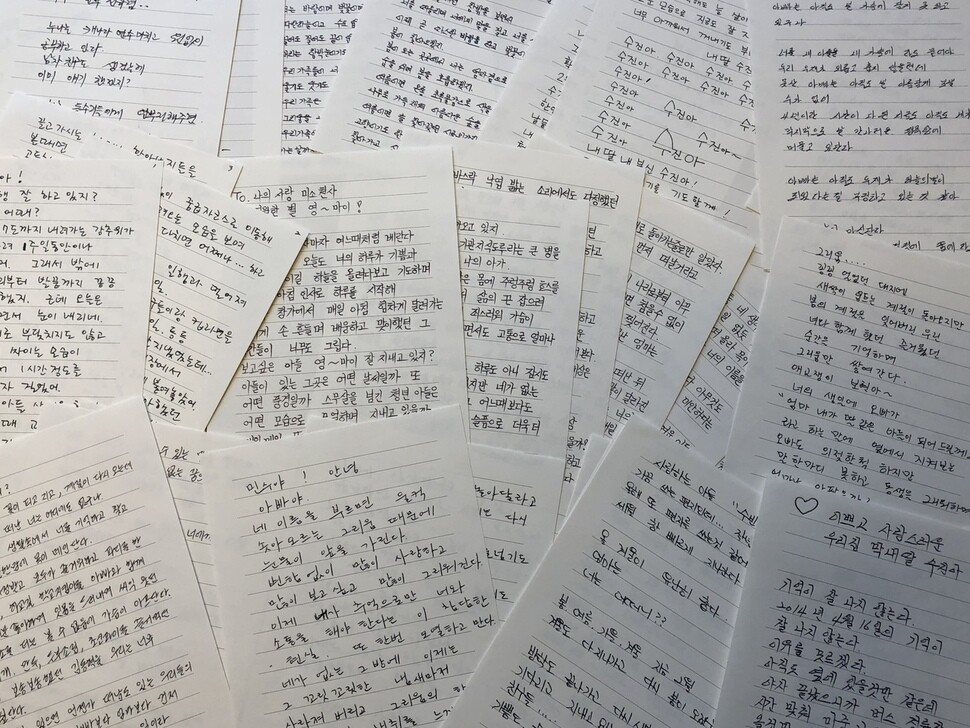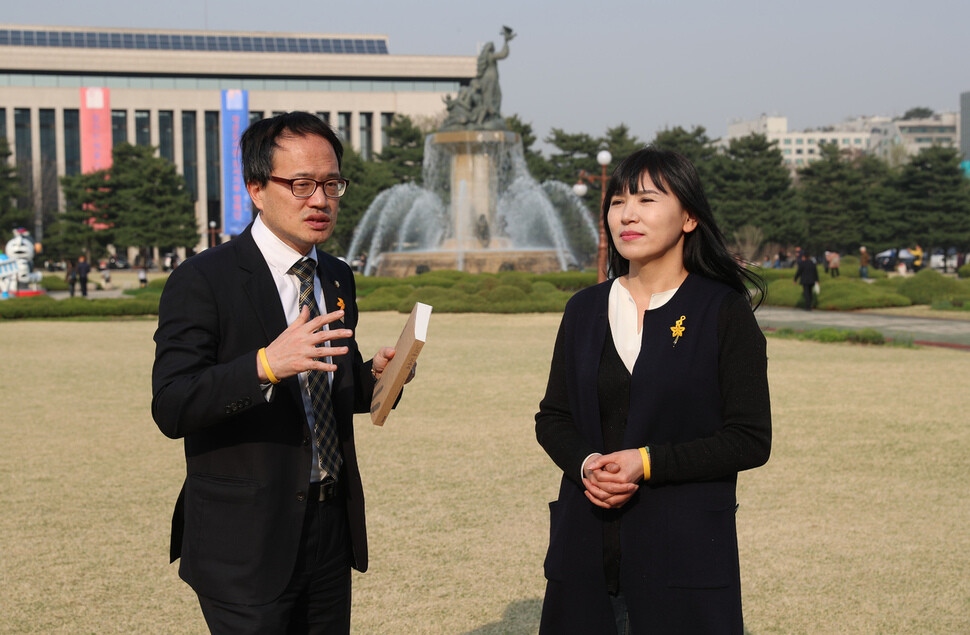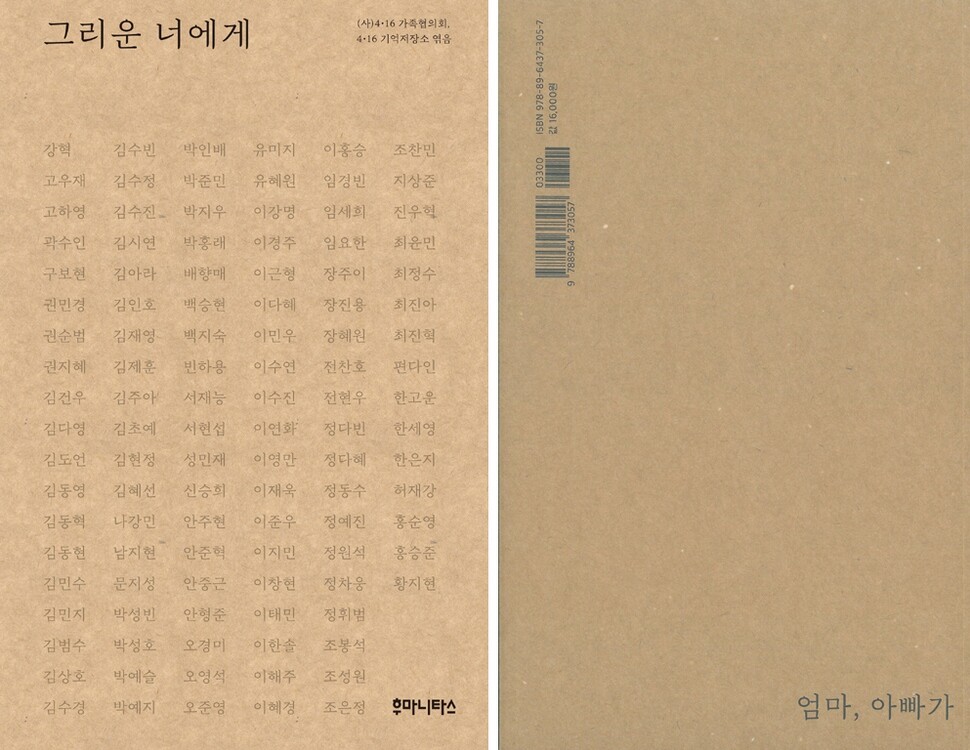hankyoreh
Links to other country sites 다른 나라 사이트 링크
Collection of handwritten letters from Sewol victims’ families published as a book

“My baby . . . I miss you so much. I want to touch you. I want to hold you.”
“It won’t be much longer before your mom and dad can see you and hold you and love you all we want.”
“You won’t forget, will you? You will remember? Your mother will find you.” (letter excerpts)
“To the One I Miss,” a collection of letters by 110 surviving family members of victims in the 2014 Sewol ferry sinking, was published on Apr. 9 by Humanitas. According to Kyobo Books, a total of 78 volumes on the Sewol tragedy had been published as of Apr. 11. “To the One” is the first to planned and written by the parents of the victims, most of whom were high school students.
“We want this to serve as pump-priming for an investigation, a ‘record of the heart’ in contrast with the other books recording the tragedy itself,” explained Lee Ji-seong, director of the 4/16 Memory Archives for the victim family members’ group 4/16 Sewol Families for Truth and A Safer Society and mother of Danwon High School Kim Do-eon, who perished in the sinking. On the afternoon of Apr. 11, the Hankyoreh met at the National Assembly Members’ Hall in Seoul’s Yeouido neighborhood with Lee and Democratic Party lawmaker Park Ju-min, the “Sewol lawyer” who wrote a testimonial for the book.

Park explained that he had gone the day before to see “Living Next Door and Dying Next Door,” a play by the “Sewol mothers.” For parents whose grief only grows with the arrival of the spring season when their children were taken away, Park said he hoped “the time spent writing the letter was a moment to forget their sorrow and sense that they are still connected to their children.”
While Lee often exchanged letters with her daughter Do-eon, many of the parents were writing a letter to their child for the first time. Beginning with the words “Beloved [name],” most of the letters ended with the message, “I hope we meet again.”
“I believed people pass away in the order they’re born,” Lee said. “I thought we [parents] would go first, and that our children would let us go. After losing my child, I have a deep desire to meet again, to keep the promises I couldn't keep and realize the happiness I couldn’t achieve. I think that’s why I talked so much in the letter about us ‘meeting again.’”
“For the children’s sacrifice to mean something, there needs to first be an investigation. It’s the only way to create a safe society,” Park said.
“And the family members. . . .” he added with a sigh. “Many of them have often said that it’s the only way they’d be able to face their children when they go to meet them someday.”
They had planned to be back on Friday. Su-jeong, who loved the rustling of bamboo forests. Ji-sook, who liked yellow freesias and the boy band EXO. A-ra, who played the role of wise counselor to her family. And Hye-gyeong, who dreamed of becoming a beauty artist. Tae-min, who took care of his younger sibling for his busy mother, came to her in a dream and cried that he was sorry to say goodbye first. Da-young’s watch continues ticking away after returning from the sea, speaking to her father for her. Young-seok’s friends cried as they talked about going into the military or his mother’s new boyfriend; some tried to take their own lives in their longing to see their departed friends. In sharing their regards with the children, many of the mothers and fathers recalled how their children had called out “mama” when they first arrived in this world.
“I think it would be tremendously difficult to write a letter to the children we miss. I didn’t have the courage at first, but I summoned the energy by thinking about how I could let people know again about the Sewol tragedy by writing a letter,” Lee recalled.
Continued calls for a thorough investigation into the sinking
“We have a new administration now, and a lot of people are saying it’s all resolved, but I’m worried that we could lose our children, or that it won’t be investigated.”
Weakened mentally and physically, many of the parents have put off receiving medical treatment.
“In my case, I find myself thinking, ‘I couldn’t take care of my baby. I couldn’t save her life. What did I do to deserve treatment?’” Lee admitted.
“The healing comes through an investigation. I think that’s the day the trauma will begin to be treated.”
Park recalled, “I visited many demolition villages and factories from my university days, but I’d never had a shock like this.”
“Going and seeing the actual families, it was like I could see lightning bolts and fire raining down over their heads,” he added.
In the book, some of the parents share with the children their sense of guilt and their feelings about the people who are more concerned with fixing an unjust society than their own welfare.
“After the tragedy, the parents became very sensitive and adamant about protecting the disadvantaged in society. I felt like I was learning more and more as time went by, and I ended up working with them for over two years.”
What the family members went through that summer in petitioning the National Assembly to enact the Special Sewol Act was truly unimaginable.
“They weren’t allowed to use the National Assembly bathrooms, they were blocked from delivering their petition documents, they were forced to crawl under police buses to get around – things you would never expect to see in the 2010s,” Park recalled.

Blaming the Park Geun-hye administration for the tragedy
“The family members and I actually thought that [former President] Park Geun-hye had not done anything [at the time of the tragedy]. But the prosecutors’ investigation findings showed that really was the case. She claimed to have received 11 reports and issued orders, and then it turned there was no real-time reporting. . . . It was staggering.”
While many believe the candlelight revolution brought a resolution to issues related to the Sewol tragedy, the parents fear that their children will be forgotten and the matter will not be fully investigated as people lose interest. A joint memorial erected by the government at a Hwarang Lake Park parking facility in Ansan, Gyeonggi Province, is to be taken down soon after a fourth anniversary event on Apr. 16. One of the parents’ deepest hopes is to build a “4/16 Life and Safety Park,” although progress remains slow. A final site was chosen and announced in late February after five resident hearings and two citizen debates – but banners have been hung out on roads branding the park a “crypt” because it would include an enshrinement facility.
“Recently, some of the opposition lawmakers have been making these banners of opposition [to the park] into their key slogans and putting them on local election placards for publicity,” Park said.
“Within the [ruling] party as well, the mood has cooled somewhat because some of the local residents appear to support [opposition to the park],” he added. “There are some worries, but we need to continue stressing that this is the right path.”
Lee stressed, “We’re keeping our promise to take down the memorial, so the city of Ansan and the government need to keep their promise to build the park.”
“The people who attended the hearings and debates cleared up some of the misunderstandings,” she added. “This place where the children played and listened to the New Year’s Eve bells when they were younger will be a tourist attraction for Ansan and the Republic of Korea.
“After reading this book, I hope people won’t just feel the parents’ sorrow, but also remember and take action. A single internet search or Blue House petition could be the start of an investigation.”
On Apr. 12, the 4/16 Memory Archives opened a website where visitors can read letters written by the parents of Sewol victims (www.416letter.com). A “To the One I Miss” book concert will be held at 7 pm on Apr. 13 in the first floor Pumda auditorium at the Seoul NPO Center.
By Lee You-jin, staff reporter
Please direct questions or comments to [english@hani.co.kr]

Editorial・opinion
![[Column] Has Korea, too, crossed the Rubicon on China? [Column] Has Korea, too, crossed the Rubicon on China?](https://flexible.img.hani.co.kr/flexible/normal/500/300/imgdb/original/2024/0419/9317135153409185.jpg) [Column] Has Korea, too, crossed the Rubicon on China?
[Column] Has Korea, too, crossed the Rubicon on China?![[Correspondent’s column] In Japan’s alliance with US, echoes of its past alliances with UK [Correspondent’s column] In Japan’s alliance with US, echoes of its past alliances with UK](https://flexible.img.hani.co.kr/flexible/normal/500/300/imgdb/original/2024/0419/2317135166563519.jpg) [Correspondent’s column] In Japan’s alliance with US, echoes of its past alliances with UK
[Correspondent’s column] In Japan’s alliance with US, echoes of its past alliances with UK- [Editorial] Does Yoon think the Korean public is wrong?
- [Editorial] As it bolsters its alliance with US, Japan must be accountable for past
- [Guest essay] Amending the Constitution is Yoon’s key to leaving office in public’s good graces
- [Editorial] 10 years on, lessons of Sewol tragedy must never be forgotten
- [Column] A death blow to Korea’s prosecutor politics
- [Correspondent’s column] The US and the end of Japanese pacifism
- [Guest essay] How Korea turned its trainee doctors into monsters
- [Guest essay] As someone who helped forge Seoul-Moscow ties, their status today troubles me
Most viewed articles
- 1[Column] The clock is ticking for Korea’s first lady
- 2Samsung barricades office as unionized workers strike for better conditions
- 3After 2 months of delayed, denied medical care, Koreans worry worst may be yet to come
- 4[Correspondent’s column] In Japan’s alliance with US, echoes of its past alliances with UK
- 5[Column] Has Korea, too, crossed the Rubicon on China?
- 6Hong Se-hwa, voice for tolerance whose memoir of exile touched a chord, dies at 76
- 7All eyes on Xiaomi after it pulls off EV that Apple couldn’t
- 8US overtakes China as Korea’s top export market, prompting trade sanction jitters
- 9[Photo] Smile ambassador, you’re on camera
- 10[Guest essay] How Korea turned its trainee doctors into monsters